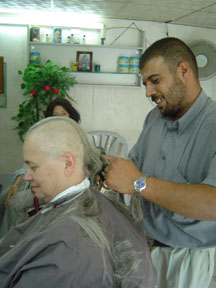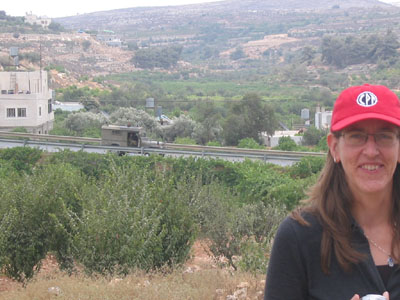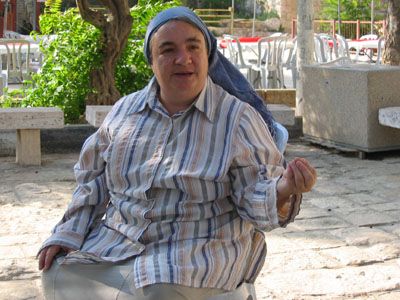Beit Ommar Action
Yesturday our delegation headed up to some home stays with families in the village of Beit Ommar. A small Palestinian farming town of between 13,000 to 14,000 people surrounded by plum, grape and olive orchards. The Israeli Settlement of Karmit Tzur lies to the south of the village, which has been slowly eating away at (i.e. appropriating) the farms of Beit Ommar. A few dunam's here (a dunam = 1/4 acre), a few there. The reason that is given? Security. There have also been home demolitions and seven Palestinians have lost their lives in the last three years since the 2nd Intifada began (we are told that not a single bullet has been fired at the Settlers or the Army since 1967 from Beit Ommar, but to be honest, I haven't had the chance to ask the Israeli Military or the Settlers what their statistics are).
As in most places, we are told, the Israelis near Beit Ommar feel insecure surrounded by so many Palestinians and any incident (rock throwing for example) leads to a crackdown by the Israeli army or the swallowing up of more lands by the Settlers (which inturn leads to more incidents).
I had traveled to Beit Ommar the week before and the road block on the main road into town was open but now it was closed and we were told that the soldiers were harrassing the taxi drivers that waited inside the gate to pick up people who walked through the road block.
"Avoid the check point," was the advice of Ghazi, a Beit Ommar Municipality worker and our translator. There are many other "roads" leading off Route 60 (the main road north from Hebron) into Beit Ommar but the Israelis have blocked all of them with dirt piles. We ask our bus to drop us off past the checkpoint, climb over one of the dirt piles and make our way to the home of Edna and Abu Raid (Edna is a Kurdish, Iraqi, Jew and the second wife of Abu Raid, a muslim). The house is filled with children and the older relatives of the extended family.
We find Edna seething ... the settlers have taken a portion of their plum orchard as part of their security zone. It is near the end of the plum season and if they don't pick soon, there won't be anything left but rotting fruit. But to pick, they need to permission of the Israeli Military and that is proving ... difficult. They were given permission on the day we arrived but then told to get out of the field after only a few hours of work.
On that first night into town, the women of our delegation are given a tractor ride out to see the edge of fields that Karmit Tzur is swallowing. We are warned not to go to close as people could be shot if they try to enter the new security zone. That night, our delegation splits into three groups, each to a different family and different stories of the Occupation and its heavy weight in Beit Ommar. Seventy percent of the people in Beit Ommar make their living from the lands around the town. More than just a few people have lost large sections of their fields. People along Route 60 are having their orchards cut down (possible cover for terrorists) and their homes demolished. When we visit the Beit Ommar municipality, we are given a long litany of damages that have been caused as a result of occupation (damage to electrical transformers shot up by Israeli soldiers, damages to the water pipes by the destruction of roads, closed or restricted industrial areas, damage to personal property and over 1.5 million in damages to the agricultural sector of the town).
But our real purpose on coming to this town on this day was the "Shaving the Land" action. Two members of the CPT team and one member of the delegration had decided that, as an act of contrition and mourning over the hardships faced by the Palestinians as a result of the Occupation, they would shave their heads. So after our visit to the Beit Ommar Municipality, we made our way to the demolished home of Ibrahim Alami, which used to stand just about a dozen yards from Route 60 and was demolished because children were seen throwing rocks down at soldiers on the road from behind the house.
Ibrahim, who took 10 years to raise the money to build the house on his family's land, had lost 5 close relatives, all killed by the Israeli army, since the beginning of the Occupation. He had suffered an industrial accident working as a mechanic. A car fell off its supports and crushed his head leaving him in a coma for a year and without any compensation or insurance since, because of the poor economic situation in Beit Ommar, he had sought work without a permit outside the Occupied Territorys in Israel.
But when the Israelies came to take his house, he told us, "They didn't demolish my home. They demolished my life."
We wandered down from his parent's house, where he lives now, to the rubble that marks the site of his demolished house and there, holding a banner in English, Arabic and Hebrew that read "Shaving the Land," Dianne, Lorin and Barbara cut off their hair. It was a small act, one that a several others associated with CPT have taken as well. But even they will say that it is not an act of dispair or defeat.
------------------------------
After returning to Hebron, we went to a meeting with a settler woman from Kiryat Arba (the original settlement here in Hebron) outside the Ibrahimi Mosque (Cave of the Patriarchs). Her name was Maizie ... Whoa, it was something else! Here is my favorite quote from her. In speaking about the early days of the settlement in Hebron, she told us that Palestinians (in her words Arabs) used to take pot shots at them when they were praying outside the Cave of the Patriarchs (i.e. the Ibrahimi Mosque and now also a synagogue where Abraham, Sarah and their kids are buried).
"All we had to protect us were our prayers," she said, then added with a sheepish smile, "And the Israeli Army."

Before: Lorin, Barbara & Dianne

Getting cleaned up at the barber shop

Yesturday our delegation headed up to some home stays with families in the village of Beit Ommar. A small Palestinian farming town of between 13,000 to 14,000 people surrounded by plum, grape and olive orchards. The Israeli Settlement of Karmit Tzur lies to the south of the village, which has been slowly eating away at (i.e. appropriating) the farms of Beit Ommar. A few dunam's here (a dunam = 1/4 acre), a few there. The reason that is given? Security. There have also been home demolitions and seven Palestinians have lost their lives in the last three years since the 2nd Intifada began (we are told that not a single bullet has been fired at the Settlers or the Army since 1967 from Beit Ommar, but to be honest, I haven't had the chance to ask the Israeli Military or the Settlers what their statistics are).
As in most places, we are told, the Israelis near Beit Ommar feel insecure surrounded by so many Palestinians and any incident (rock throwing for example) leads to a crackdown by the Israeli army or the swallowing up of more lands by the Settlers (which inturn leads to more incidents).
I had traveled to Beit Ommar the week before and the road block on the main road into town was open but now it was closed and we were told that the soldiers were harrassing the taxi drivers that waited inside the gate to pick up people who walked through the road block.
"Avoid the check point," was the advice of Ghazi, a Beit Ommar Municipality worker and our translator. There are many other "roads" leading off Route 60 (the main road north from Hebron) into Beit Ommar but the Israelis have blocked all of them with dirt piles. We ask our bus to drop us off past the checkpoint, climb over one of the dirt piles and make our way to the home of Edna and Abu Raid (Edna is a Kurdish, Iraqi, Jew and the second wife of Abu Raid, a muslim). The house is filled with children and the older relatives of the extended family.
We find Edna seething ... the settlers have taken a portion of their plum orchard as part of their security zone. It is near the end of the plum season and if they don't pick soon, there won't be anything left but rotting fruit. But to pick, they need to permission of the Israeli Military and that is proving ... difficult. They were given permission on the day we arrived but then told to get out of the field after only a few hours of work.
On that first night into town, the women of our delegation are given a tractor ride out to see the edge of fields that Karmit Tzur is swallowing. We are warned not to go to close as people could be shot if they try to enter the new security zone. That night, our delegation splits into three groups, each to a different family and different stories of the Occupation and its heavy weight in Beit Ommar. Seventy percent of the people in Beit Ommar make their living from the lands around the town. More than just a few people have lost large sections of their fields. People along Route 60 are having their orchards cut down (possible cover for terrorists) and their homes demolished. When we visit the Beit Ommar municipality, we are given a long litany of damages that have been caused as a result of occupation (damage to electrical transformers shot up by Israeli soldiers, damages to the water pipes by the destruction of roads, closed or restricted industrial areas, damage to personal property and over 1.5 million in damages to the agricultural sector of the town).
But our real purpose on coming to this town on this day was the "Shaving the Land" action. Two members of the CPT team and one member of the delegration had decided that, as an act of contrition and mourning over the hardships faced by the Palestinians as a result of the Occupation, they would shave their heads. So after our visit to the Beit Ommar Municipality, we made our way to the demolished home of Ibrahim Alami, which used to stand just about a dozen yards from Route 60 and was demolished because children were seen throwing rocks down at soldiers on the road from behind the house.
Ibrahim, who took 10 years to raise the money to build the house on his family's land, had lost 5 close relatives, all killed by the Israeli army, since the beginning of the Occupation. He had suffered an industrial accident working as a mechanic. A car fell off its supports and crushed his head leaving him in a coma for a year and without any compensation or insurance since, because of the poor economic situation in Beit Ommar, he had sought work without a permit outside the Occupied Territorys in Israel.
But when the Israelies came to take his house, he told us, "They didn't demolish my home. They demolished my life."
We wandered down from his parent's house, where he lives now, to the rubble that marks the site of his demolished house and there, holding a banner in English, Arabic and Hebrew that read "Shaving the Land," Dianne, Lorin and Barbara cut off their hair. It was a small act, one that a several others associated with CPT have taken as well. But even they will say that it is not an act of dispair or defeat.
------------------------------
After returning to Hebron, we went to a meeting with a settler woman from Kiryat Arba (the original settlement here in Hebron) outside the Ibrahimi Mosque (Cave of the Patriarchs). Her name was Maizie ... Whoa, it was something else! Here is my favorite quote from her. In speaking about the early days of the settlement in Hebron, she told us that Palestinians (in her words Arabs) used to take pot shots at them when they were praying outside the Cave of the Patriarchs (i.e. the Ibrahimi Mosque and now also a synagogue where Abraham, Sarah and their kids are buried).
"All we had to protect us were our prayers," she said, then added with a sheepish smile, "And the Israeli Army."

Before: Lorin, Barbara & Dianne

Getting cleaned up at the barber shop

After!


Kevin's shot of Sophia with some curious Israeli soldiers who came to check out the Action

"The outside world has one rule for them and another rule for us."
Maizie, a Kiryat Arba Settler in Hebron, making a point.

4 Comments:
So, let me get this straight. Maizie is saying that there were prayers held in the Tomb of the Patriarchs, and the praying Jews were being shot at, or having rocks thrown at them, and the Israeli soldiers were standing around doing nothing?
Highly unlikely, in my experience.
But then, if a settler tells me it's daytime, I poke my nose out the window to double check, that's how impressed I've been with their integrity, so far.
Bless you, for your work. Port Townsend is lovely, with August bringing low clouds and winds and the scent of rain, bleating fog horns from ferries and the hourly bell, ringing in a chane of time - but your blog lets the smells of Palestine in, though my screen. Maybe I'll go back, one day, when Israel and Palestine become one organizational entity, one man, one vote - one state. Not before then, though.
Peace,
Dena Shunra
By Anonymous, at August 04, 2004 9:03 AM
Anonymous, at August 04, 2004 9:03 AM
Hi Blogger, I have been scouring the internet for the best work at home job opportunity. this post wasn't exactly what I had in mind, but the information it gave me was great! There is so much information about " work at home job opportunity " out there and I want to just keep my options open. Great post, thanks for your incite!
By Anonymous, at November 11, 2005 6:58 PM
Anonymous, at November 11, 2005 6:58 PM
Hi Blogger, you have a nice blog. Glad to see it. Today I was out blog surfing looking for detailed info on work at home choices when I found your page. Your site is not an exact match but it did catch my interest. I am going to add you to my favorite list of blogs for future reading and reference. Should you ever need
information on work at home choices then drop by the site above and check it out.
By Anonymous, at November 27, 2005 3:17 PM
Anonymous, at November 27, 2005 3:17 PM
Hi Blogger I’ve been looking for gifts related blogs and I came across yours on this post during my trawl, so I thought it would be polite to let you know about my visit. You are most welcome to come and visit me at gifts. I would also be happy to trade links with you if you are interested. Bye for now and have a nice day! Roy.
By Anonymous, at December 09, 2005 4:27 AM
Anonymous, at December 09, 2005 4:27 AM
Post a Comment
<< Home